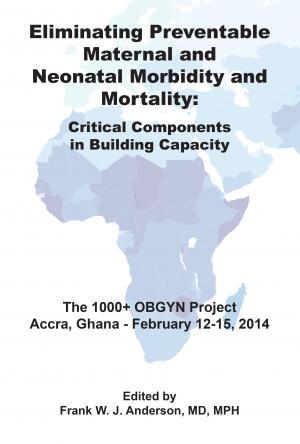
Eliminating Preventable Maternal and Neonatal Morbidity and Mortality: Critical Components in Building Capacity
The World Health Organization (WHO) has called upon the global health community to “End Preventable Maternal Mortality by 2030”. This book is the 2nd in a series that highlights issues and proposes solutions to maternal mortality by ending the dearth of expert capacity in Obstetrics and Gynecology (OBGYN) for both clinical care and national leadership in Sub-Saharan Africa. Ending preventable maternal and early neonatal mortality will require this critical yet undeveloped component of a comprehensive global public health response.
This volume follows the first, entitled Building Academic Partnerships to Reduce Maternal Morbidity and Mortality: A Call to Action and Way Forward, which identified the critical components for capacity building in expert women’s health care. Each chapter of this current edition is organized to address these critical components from multiple perspectives including African obstetrician/gynecologists, Ministries of Health and Education, American/European obstetrician/gynecologists and professional organizations.
Within the pages of this book, readers will encounter the tremendous passion African OBGYNs have for expanding their expertise to deal with the tragedies that befall them on a daily basis. The reader will hear from global OBGYN leaders who represent established university-based OBGYN programs, global and national professional societies, and international clinical organizations. The entire specialty of OBGYN is poised to mobilize the educational resources, experience and expertise to support African OBGYNs in their re-invention of Obstetrics and Gynecology in the African context, for the African continent.
We encourage you to take the time to read and absorb the transcribed words from the world’s experts in Global Obstetrics and Gynecology. Their messages cannot be transmitted in sound bites, extracted phrases or bullet points. A complete reading of this book will leave the reader with a deep understanding of the issues and solutions. In 2015, we are rightly focused on maternal, perinatal and early neonatal mortality. This urgent crisis must continue to be aggressively addressed, but a long-term view would demand that targeted interventions must not occur in a vacuum. The specialists who provide critical and lifesaving obstetric care are the same ones who can diagnose fetal problems, diagnosis and treat ectopic pregnancy both medically and surgically, and treat the myriad medical and surgical issues that face women throughout their lifetime. In essence, they provide the complex, evidence-based interventions that women in most parts of the world enjoy.
The rich text presented herein will not only tell the story, but will also provide the concrete steps needed replicate the successful Ghana experience – sustainably - in other African countries. The 1000+ OBGYN Project (www.1000obgyns.org) has brought together a vast array of educational resources and a network of university programs, expert clinical organizations and professional societies to implement this collective wisdom. The group is poised for action, but will require substantial investments from both national and global funders to jumpstart what will certainly be a game changer for each country involved. We welcome your interest and participation. Starting now.

Eliminating Preventable Maternal and Neonatal Morbidity and Mortality: Critical Components in Building Capacity
Jump to:
| Document Title | Creator | Downloads | License |
|---|---|---|---|
|
About the Editor |
Frank Anderson
|
||
|
Appendix I: OBGYN Program Development Worksheets - Instructions for Group Process |
Frank Anderson
|
||
|
Appendix II: Conference Participants |
Frank Anderson
|
||
|
Appendix III: Partnership Worksheets |
Frank Anderson
|
||
|
Appendix IV: Country Summary Profiles |
Frank Anderson
|
||
|
Appendix V: Presentation Abstracts |
Frank Anderson
|
||
|
Appendix VI: 1000+ OBGYN Project |
Frank Anderson
|
||
|
Appendix VII: The Elmina Declaration |
Frank Anderson
|
||
|
Chapter 01: Introductions and Welcome |
Frank Anderson
|
||
|
Chapter 02: Conference Goals and Results from Needs Assessment |
Frank Anderson
|
||
|
Chapter 03: Authentic Partnership |
Frank Anderson
|
||
|
Chapter 04: Models for Infrastructure and Program Design |
Frank Anderson
|
||
|
Chapter 05: Curriculum, Faculty Development and Assessment for OBGYN Residency |
Frank Anderson
|
||
|
Chapter 06: Deployment of OBGYNs, Working with Ministries, Communities and Other Healthcare Partners |
Frank Anderson
|
||
|
Chapter 07: Research, Monitoring, Evaluation and Quality Assessmen |
Frank Anderson
|
||
|
Chapter 08: Certification and Accreditation of OBGYNs |
Frank Anderson
|
||
|
Chapter 09: African OBGYN Perspectives |
Frank Anderson
|
||
|
Chapter 10: African Ministry of Health Perspectives |
Frank Anderson
|
||
|
Chapter 11: American OBGYN and Professional Society Perspectives |
Frank Anderson
|
||
|
Chapter 12: Final Country Presentations |
Frank Anderson
|
||
|
Complete book: Compressed .pdf of all book content |
Frank Anderson
|
||
|
Conference Follow Up Letter |
Frank Anderson
|
||
|
Opening material |
Frank Anderson
|



